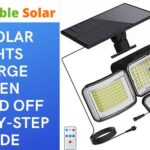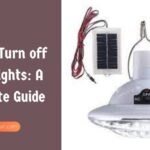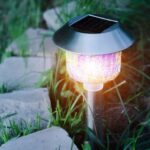Why Is There An On Off Switch On Solar Lights – Tangible Solar?
Have you ever noticed how solar lights have an on/off switch? Is turning them off necessary? Isn’t it true that they’ll just switch off as the sun sets? There’s a good reason behind it, as it turns out. Continue reading to learn what it is. The Best Outdoor Solar Lights For Signs
Why is there an on-off switch on solar lights? The following four reasons
Although solar lights come on and off automatically, there are at least four situations in which it makes sense to switch them off. (This isn’t true of every model.)
1. There are moments when you just want to be in the dark. The last thing you want in your eyes while stargazing is light.
2. You’re throwing a party in your backyard and want to make sure your lights are fully charged.
If you’re concerned that your lights won’t be fully charged for your event, turn them off a day or two ahead of time and then switch them back on right before the party begins. That way, you’ll be able to charge for two or three days without having to pay the money.
(This method is discussed in detail in another of our articles, “How to Make Solar Lights Stay On For Longer.”)
3. Because some solar lights are designed to be used indoors, you’ll want to be able to turn them on and off just like any other indoor light. Shed lights, for example, are a good example of this.
4. Another reason to switch off your lights is if you’re putting them in storage or moving them.
Your lights are most likely in a box or the back of a truck while being transported, and the lack of light may signal the lights to turn on.
That’s a waste, especially if you plan on using your solar lights when you get to your new location. Save precious batteries by using the on/off switch on your solar lights.
If everything else is equal, a set of solar lights with a switch to turn them on or off makes sense.
How to Keep Your Solar Lights in Working Order
Solar lights are a great way to save energy and money on your electric bill, but they must be maintained regularly to stay in good working order. One of the most important things you can do to keep your solar lights on is to make sure the switch is turned on. When installing solar lights, many individuals forget to turn on the switch, which can result in poor performance or even a dead light.
You should also examine the angle at which your solar panels are oriented regularly. Make sure they’re pointing as much as possible towards the sun; if they don’t get enough sunlight, your lights won’t charge properly. You may occasionally need to clean your solar panels; simply wipe them down with a moist cloth to remove any dirt or debris.
If you follow these guidelines, your solar lights should offer enough light for many years to come.
What is the process for turning on and off solar lights?
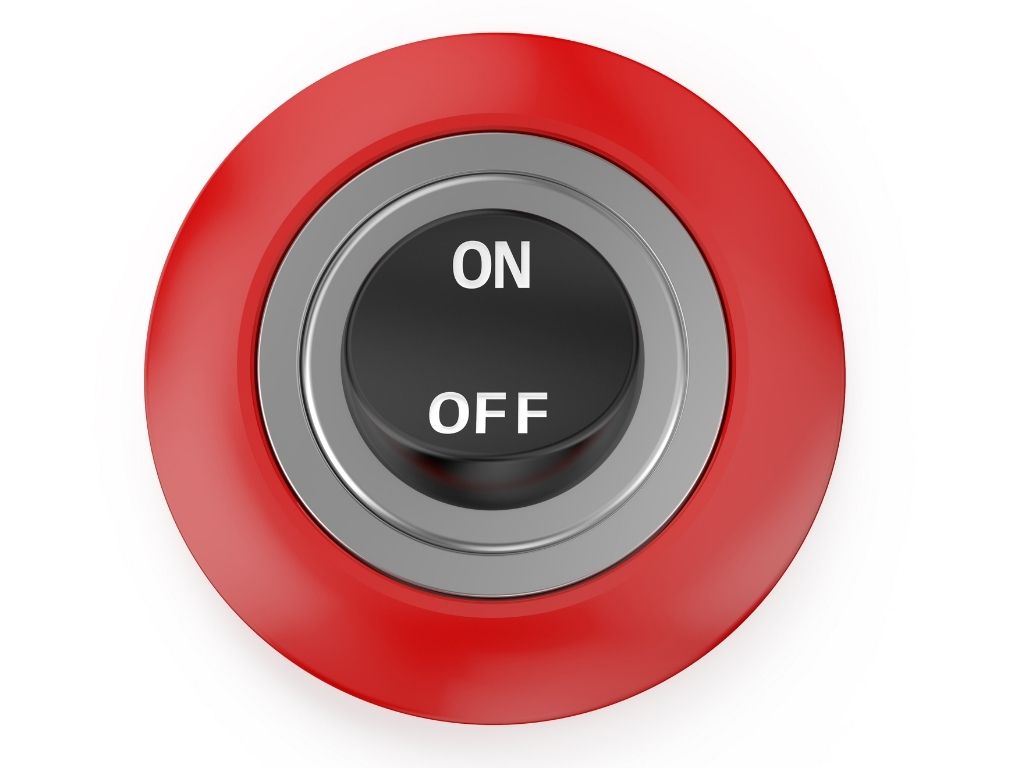
Human creativity is incredibly wonderful, and solar lights are a prime example. Manufacturers’ designs will vary, however, there is one common process in solar lights:
To begin, realize that the LED light must have a minimum threshold voltage to turn on. Let’s say the threshold is 3.5 volts in this case.
In the light now, there are two separate circuits at work. We’ll refer to these as Circuit A and Circuit B. At all times, one of these is supplying current to the LED. Circuit A carries the current at 1.2 volts, whereas circuit B enhances the voltage to 3.7 volts. To put it another way, only circuit B has adequate voltage to light up the LED.
When the sun shines, current flows from the solar panel and circuit A (the default circuit) operates, providing 1.2 volts. This is sufficient to charge the battery but insufficient to turn on the LED.
The decline in voltage shuts down circuit A as night falls and energy from the solar panel is no longer received. This activates a switch, which activates circuit B.
Circuit B, which is powered by the battery rather than the solar panel, operates at 3.7 volts. This exceeds the LED’s minimal threshold, causing it to turn on.
Is it necessary to turn on solar lights?
When you acquire your new solar lights and begin setting them up, double-check to see whether there is an on/off switch. If there is, turn it on.
Daily, however, there is no need to turn on your lights because the circuitry will take care of them. (See the preceding paragraph.) As the day fades to night, solar lights are meant to turn on automatically.
The stronger “spotlight” or “security light” types will usually have a switch, but the more ornamental path lights will not.
One reason for this is practicality: path lights and ornamental accent lights are frequently sold in packs of eight or ten, and you wouldn’t want to repeat the process for each light in the set.
Another consideration is construction quality: solar spotlights and solar security lights are more likely to be built to better standards, with monocrystalline solar panels, larger panels, and greater mAh batteries.
Because these lights frequently have several modes (low light, bright light), the ability to turn them off altogether is just another benefit of superior build quality.
Is it necessary to turn on solar lights to charge them?
It shouldn’t make a difference, and all of the models we’re aware of will keep charging the battery even if they’re switched off. Check the owner’s manual for any instructions on this, just to be safe.
What difficulties might the on/off switch cause?
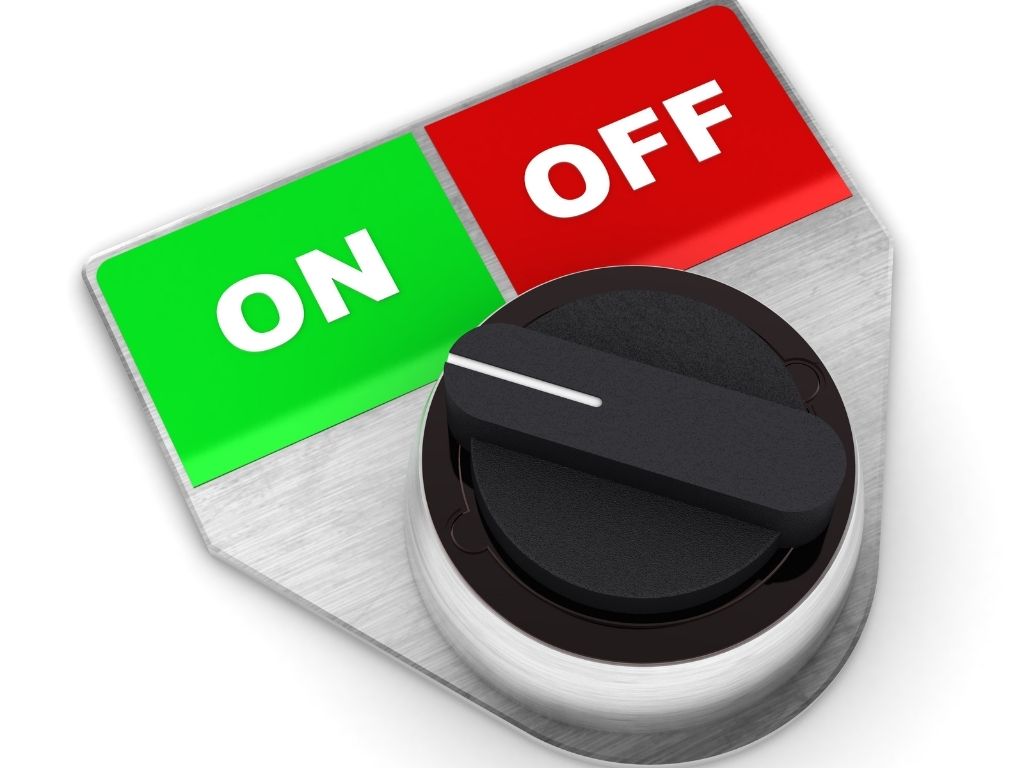
The on/off switch is a possible cause of trouble for a new owner who is unaware of its existence. The switch being in the off position is one of the most prevalent causes of “my new solar lights aren’t working” complaints.
Another potential issue is that if you put the solar light on a wall, such as a security light, the on/off switch may be difficult to reach. Before installing the light, double-check that the switch is turned on.
So there you have it: our solutions to the question “Why are solar lights equipped with an on/off switch?
Solar Lights Frequently Asked Questions?
When my solar lights don’t turn on at night, what should I do?
The batteries may need to be replaced. If they’re rechargeable, check that you’re charging them using the appropriate charger. Even if they aren’t rechargeable, there’s a chance that they still have enough charge to endure one more sunset. Try keeping them out all day – or even overnight!
When dark comes along again, the longer they sit outside, the brighter and stronger their light will be.
Is there a method to prevent solar lights from fading throughout the season?
Yes! There are a few strategies to keep your investment safe year after year. One thing you can do is make sure your solar lights are cleaned regularly. Over time, dust and debris can accumulate on the panels, reducing their ability to collect sunlight.
A light cover for your solar lights is also available. This will shield them from the weather and keep them gleaming brightly throughout the season!
When it comes to solar lights, how long do they last?
Solar lights have a two-year average lifespan, however, this varies depending on how often they are used and how well they are maintained. You can ensure that your solar lights survive as long as possible by following these guidelines!
What’s the difference between solar lights that use LEDs and those that use incandescent bulbs?
LED (light-emitting diode) solar lights utilize less energy and can last up to 50,000 hours, compared to standard incandescent solar lights. As a result, they require less maintenance and last longer than incandescent solar lights. In addition, LED solar lights come in a larger range of colors than standard incandescent!
Is it possible to utilize solar lights indoors?
Solar lights should not be used indoors since they require direct sunshine to work effectively. Consider getting a lamp or light fixture that incorporates solar panels into its design if you want to use solar illumination indoors!
Is it necessary for me to place my solar lights in the sun?
You don’t have to set your solar lights in the sun, but it is the greatest location for them! Solar panels turn sunshine into energy, therefore the more direct sunlight they receive, the more energy they produce. Don’t worry if you can’t set your solar lights in a sunny location; they’ll still operate, but they won’t be as bright.
I have a solar light with a motion sensor. Is it necessary for me to turn it off?
No, when the motion sensor moves, it will turn on and stay on for a predetermined period. It will switch off once this time has passed until it detects movement again.
Where should I put solar lights?
Solar lights can be used anywhere there is a requirement for illumination. They’re ideal for walkways, driveways, front porches, and other areas. You may also use them to beautify your yard or outdoor space; position a few around your house’s perimeter for added security!
When you turn on solar lights, how long do they take to turn on?
Solar lights normally take 30 seconds to two minutes to turn on after they’ve been turned on. This is determined by the type of solar light you have as well as the weather. It may take longer for your solar lights to switch on if it is foggy or raining heavily.
If my solar light isn’t working, what should I do?
The first thing you should do if your solar light isn’t working is to check the battery. Make sure that the rechargeable lithium-ion or nickel-cadmium (NiCd) battery in your solar lamp is fully charged.
Look at the brightness level of your solar lights to see whether they’re working properly — they should be as bright as usual when turned on!
Is the solar lighting I’ve purchased waterproof?
Solar lights intended for outdoor use usually have an IP66 classification, indicating that they are entirely impervious to dust and water jets from all directions. As a result, they’re suitable for both indoor and outdoor use.
Why is there an on/off switch on my solar lights?
Since solar lights are busy converting light into energy to be stored in the batteries, they normally turn off automatically throughout the day. The light is then powered by this energy at night.
Should a solar light switch be on or off while it’s being charged?
Numerous solar-powered lights continue to charge even while they are off, so switching them off allows the battery to fully charge over several days of sunlight. Using solar lights to do this regularly is a good idea.
Is it necessary to turn off solar lights during the day?
When turned ON, the solar light will be in use much like other electrical devices. Additionally, pressing the OFF button is not required when you are not utilizing it. All solar lights, though, lack on/off switches. As a result, it can often be difficult to tell whether solar lights are on or off.
If a solar light is on, how can you tell if it is off?
The solar panel should be pointing down and covered by your hand or the ground. It is in good operating order if the lights come on. The lights automatically come on at night and go back on during the day, so there is no need to turn them off.
My solar lights won’t turn on; why?
Solar lights require sunlight to function, so if they are not receiving enough of it, they will not function. For your solar light to function correctly, make sure that it is installed or put in an area where it receives enough sunshine to charge its battery.
Conclusion
The reason for having an on/off switch on a solar light is primarily a matter of personal preference, usage, and whether or not a manufacturer includes one. They’re more likely to be on spotlights and security lights than decorative lights. However, in some circumstances, this can be beneficial.
For example, you could want to turn them off to guarantee that the battery stays charged for a nighttime garden party. Perhaps you’d want to utilize them throughout the day because it’s gloomy and cloudy outside. The switch, on the other hand, does not have to be turned on or off to get a charge.
They should, however, be switched on so that they can be seen when you need them. Unfortunately, some people are unaware that their solar lights have a switch, and they become frustrated when they don’t work. Before charging, installing, or using the solar lights, make sure you read all of the instructions.

